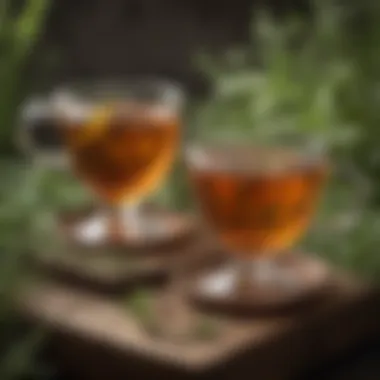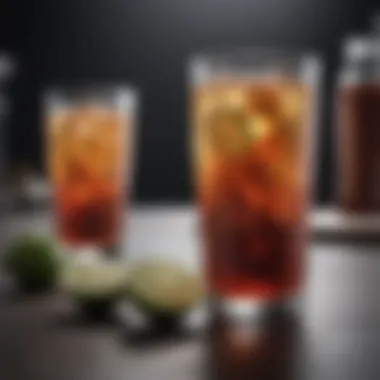No Calorie Drinks for Fasting: A Complete Guide


Well-Being Overview
Prelims to the topic
Fasting has gained popularity as a method for enhancing physical and mental well-being. It involves the conscious decision to abstain from food, usually for a set period, allowing the body to enter a state of autophagy and metabolic adaptation. A commonly considered aspect during fasting is hydration. More individuals today are exploring no calorie drinks as suitable options to maintain hydration, without negatively affecting fasting goals.
Importance of focusing on this aspect of well-being
Understanding how to effectively hydrate during fasting is critical. Not all beverages yield the same effects on the body when it is in a fasting state. In managing one's general health, informed decisions regarding drink options play a significant role. No calorie drinks, such as water, herbal teas, and certain flavored sparkling waters, assist in hunger management while supporting hydration.
Adopting a focus on liquid intake ensures individuals maximise the physical benefits of fasting without diminishing their mental clarity and health. Practitioners, such as health professionals, nutritionists, and fitness trainers, must be aware of both the favorable and potentially unfavorable effects associated with various choices.
“The drinks you choose during a fast can influence your mental and physical performance. Hence it's crucial to make intelligent decisions about your hydration.”
Maintaining awareness of personal taste preferences, eating habits, and overall nutrition becomes crucial. The following sections will evaluate specific no calorie drinks in more depth and their implications on physical wellness.”
Preamble to Fasting and Hydration
Fasting has gained considerable traction in health and wellness circles, revealing not just its potential benefits, but also the foundational role that hydration plays during these periods. Understanding the dual relationship between fasting practices and proper hydration can enhance results substantially. While fasting aims to achieve several health goals, such as weight management or improved metabolic health, users can't ignore the importance of keeping the body fully hydrated during such undertakings. Let's delve deeper into the key elements related to fasting and hydration.
Understanding Fasting
Fasting can take several forms, ranging from intermittent fasting to prolonged juice fasts. Essentially, it involves a voluntary abstinence from food for a specific duration. Participants frequently engage in fasting hoping to achieve various outcomes.
One of the physiological processes initiated during fasting is the shift from glucose to fat as a fuel source through ketosis, effectively altering metabolism. It's essential for aspirants to recognize these transitions carefully. Each type of fasting carries distinct rules and variations applicable to their physiological responses. Therefore, understanding the aspects of these different fasting regimens can help adherents align their practices with their personal health goals.
Nevertheless, fasting is rarely successful when done improperly. Individuals often experience fatigue or dips in energy, which can disrupt daily life. Keeping hydrated becomes essential, as it can mitigate some discomfort during fasting.
The Importance of Hydration
Hydration is a cornerstone of overall health, but it assumes heightened significance during fasting. We often underestimate the effects of dehydration, which may not be immediately recognized but can lead to several disruptions both mentally and physically.
Staying hydrated during fasting helps facilitate a range of bodily functions, such as temperature regulation, joint lubrication, and nutrient absorption. More importantly, adequate water intake can lessen common challenges like hunger pangs. In terms of cognitive function, hydration impacts levels of concentration and mood, essential considerations especially for those advising or active in insightful discussions on this matter.
Moreover, it's vital to distinguish between beverages that keep one hydrated versus those that might lead to unintended consequences. Focusing on no-calorie drinks aligns well with hydration needs while ensuring one adheres to their fasting goals. Effective hydration strategies integrate fluid replenishment as a route to than mere satiation, enabling practitioners to navigate their fasting journeys more seamlessly.
“Hydration is not just crucial for everyday life; its importance amplifies fundamentally during fasting. What you drink can determine your fasting efficacy.”
Understanding these dynamics between fasting and hydration paves the way for thoughtful choices that reinforce routines. Ensuing sections in this comprehensive guide will delve into specific options available, categorizing drinks that align with both hydration and fasting goals.
Defining No Calorie Drinks
Understanding no calorie drinks and their definitions serve as a foundation for anyone exploring fasting. This segment demystifies common aspects related to these drinks, focusing on their attributes, perception, and relevance in fasting practices.
What Constitutes No Calorie Drinks
No calorie drinks are defined as beverages that contain little to no calories, ideally not affecting the body's energy balance. Many mainstream beverages often get classified under this category due to their minimal caloric value during consumption. Common examples are water, unsweetened teas, and black coffee. When looking at no calorie drinks, it is crucial to consider how an item's formulation contributes to its caloric content.


Most soft drinks launch with artificial sweeteners such as aspartame or sucralose, which provide sweet taste without substantial calories. Similarly, flavored sparkling waters are a growing trend as they offer essence without adding calories, thus are often favored by those who wish for restorative hydration without the caloric burden. Understanding the distinction here is key because it informs choices aligning with health goals—
- Water: 0 calories, hydrating, essential to bodily processes.
- Black Coffee: About 2 calories per 8-oz serving, provides alertness and focus.
- Herbal Teas: Generally 0 calories, depending on the additions, are diverse in flavors and health benefits.
- Diet Sodas: They may include artificial sweeteners but might raise questions about their health impact.
Evaluating the individual drink can encourage informed selections conducive to personal dietary objectives and fasting plans.
Common Misconceptions
Misunderstandings abound when it comes to no calorie drinks and their role in fasting. Below are notable fallacies that might lead to confusion:
- All Diet Drinks Are Healthy: Provided calories are absent, it does not guarantee healthfulness. Some drink formulations may lead to spikes in hunger or cravings, influencing overall dietary choices negatively.
- No Calorie Drinks Cause No Digestive Response: The notion asserts that consuming these beverages will have zero impact on metabolism. Contrary to this logic, consuming certain drinks like caffeinated beverages may activate metabolism slightly.
- Hydration Sufficientness of All No Calorie Drinks: Not every no calorie drink serves ideal hydration purposes. For example, caffeinated drinks can sometimes lead to a diuretic effect, decreasing hydration levels despite their perceived
Types of No Calorie Drinks for Fasting
Understanding the types of no calorie drinks available during fasting is crucial for optimizing one's fasting experience. These beverages are often seen as essentials, as they can aid in maintaining hydration without breaking the fast. Considering each option classifies how it influences the body can facilitate informed choices aligned with individual wellness goals. By exploring their properties, implications on appetite and fat burning, consumers gain clarity on selecting the right drinks to support their fasting regimen.
Water: The Essential Choice
Water is the most straightforward choice for anyone engaging in fasting. It plays an indispensable role not just in hydration, but also in supporting bodily functions. The act of drinking water helps maintain cellular health while aiding in digestion and nutrient transport. Many athletes and wellness advocates recommend staying properly hydrated as a keystone to overall health and fasting success. Essentially, consuming adequate amounts of water during fasting can stave off dehydration symptoms, which include fatigue and dizziness.
Herbal Teas: Variety and Benefits
Consuming herbal teas introduces flexibility and flavor to one’s fasting experience. These drinks come in many varieties, each with its own unique attributes and benefits.
Types of Herbal Teas
Herbal teas, unlike traditional teas, are typically brews made from various herbs, flowers, and spices rather than the leaves of the Camellia sinensis plant. Examples like chamomile, peppermint, and hibiscus display distinct flavors and healthful characteristics. Chamomile is known for its calming properties, while peppermint can help with digestion. This broad array allows individuals to personalize their choices based on preference and desired effects.
Potential Health Benefits
The benefits stemming from herbal teas can sound attractive, particularly in a fasting context. For instance, certain herbal teas are prized for their potential detoxifying effects. Green tea may offer increased metabolism support due to its catechin content. Being virtually calorie-free, herbal teas contribute positively in terms of hydration. However, individuals should approach with caution since not all herbal teas are beneficial for everyone, and individual reactions can vary significantly.
Black Coffee: A Popular Option
Black coffee remains a favored drink during fasting for those who enjoy its robust flavor and stimulating properties. It delivers caffeine, which может enhance alertness and potentially supports fat burning when consumed without any additions. However, moderation is crucial since excessive coffee intake can lead to dehydration and jitteriness. For many, black coffee serves as a way to manage cravings while keeping the caloric intake at bay.
Green Tea: Antioxidant Properties
Green tea's appeal lies largely in its rich supply of antioxidants, particularly epigallocatechin gallate (EGCG). This compound possesses properties linked to fat oxidation and improved metabolic rate. A cup of green tea often satisfies the palate while offering biological benefits, which makes it a common choice during fasting periods. Those looking to incorporate green tea should find various formats available, from loose leaf to tea bags, ensuring opportunity for a personalized experience.
Sparkling Water: A Refreshing Alternative
Sparkling water introduces an interesting twist by providing effervescence without adding calories. This makes it an attractive beverage for fasting individuals wanting to curb sweetness cravings. Many individuals enjoy flavored varieties as a means to ease the tedium of various drink options. It’s essential, however, to review the ingredient list to ensure no sweeteners are added.
Zero-Calorie Soft Drinks: A Controversial Choice
While zero-calorie soft drinks could be tempting for those managing cravings, opinions on their consumption vary. While they deliver enticing flavors without calories, some experts express concern about artificial sweeteners potentially impacting appetite. Others suggest that these drinks can lead followers of intermittent fasting toward unsustainable habits. Buyers of zero-calorie soda should evaluate place within their broader fasting and nutritional strategies.


Impact of No Calorie Drinks during Fasting
Understanding the impact of no calorie drinks during fasting is crucial. This topic brings together the theory and practice of fasting, focusing on aspects like metabolic function and appetite regulation. Knowing how these beverages affect fasting can lead to better hydration choices, which may enhance the potential benefits observed during fasting periods. This knowledge bedrock is vital for anyone interesado in optimizing their fasting experience.
Effects on Metabolism
Metabolism refers to all chemical processes in the body that convert food into energy. When fasting, metabolism undergoes certain changes. No calorie drinks may play a role in this.
- Caloric Intake Management: No calorie drinks do not supply energy in the form of calories and can aid in maintaining the fasting state. This can help preserve metabolic processes such as fat oxidation, allowing the body to efficiently use its stored energy.
- Insulin Effects: Consuming no calorie drinks can lead to minimal insulin responses. Low insulin levels during fasting are significant because they can encourage fat breakdown, supporting weight-loss goals.
- Hydration Balance: Staying properly hydrated with water or herbal tea can support metabolic integrity. Dehydration can lead to sluggish metabolic functions, hindering the benefits of fasting. Therefore, maintaining hydration with acceptable no calorie drinks may optimize metabolic outcomes.
Studies suggest that hydration positively affects metabolic performance (Source: Wikipedia). Keep that in mind when making beverage choices during fasting.
Influence on Appetite and Cravings
The connection between no calorie drinks and hunger cues is quite important when considering weight management and overall fasting success. These drinks can impact how a person feels during their fasting window.
- Temporary Appetite Suppression: Drinking zero-calorie beverages might offer temporary suppression of appetite. For some, the sensation of drinking something refreshing can trick the mind momentarily away from hunger.
- Reduced Cravings: Certain types of no calorie options, especially flavored drinks, may help to reduce cravings for more caloric options. This could assist in staying committed to a fasting plan. Alongside this, human psychology around taste and satisfaction also affects how individuals handle hungry moments.
- Mindful Choices: The action of choosing no calorie drinks during fasting fosters a mindful approach to eating. When one focuses on selecting drinks that complement their fasting goals, it generally combines well with the broader nutritional choices.
To summarize, no calorie drinks wield a distinct influence over hunger management during fasting periods. Recognizing their role allows individuals to navigate cravings and encourage healthier habits effectively.
Benefits of Integrating No Calorie Drinks
In the discussion surrounding fasting, integrating no calorie drinks can provide several advantages. As we navigate through fasting protocols, maintaining correct hydration and energy levels is essential for achieving intended health outcomes. By focusing on specific factors, these drinks can serve as helpful allies in the journey of fasting.
Maintaining Hydration Levels
Hydration often gets overlooked in fasting discussions. Suboptimal hydration can lead to issues such as fatigue, headaches, and even impaired cognitive functions. Thus, incorporating no calorie drinks can help sustain hydration without breaking your fast.
Water remains the essential choice, but exploring other no calorie options promotes a diverse hydration strategy. Herbal teas and unsweetened sparkling waters are examples of beverages that enhance variety while keeping calorie counts low. Staying hydrated can improve your overall body function and aid body systems while fasting.
You're not simply staying hydrated; you're actively supporting processes like digestion and metabolism. Observing the phenomenon of electrolyte balance is another important aspect. While most drinks have negligible sodium, potassium, while you might prioritize renewal of fluids, illuminating sole water intake could mitigate the overall provisioning of required electrolytes generally misdiagnosed during restriction periods. This marks a significant branch of observing body hydration.
Supporting Energy Levels
Energy levels may fluctuate during fasting. Some practitioners might notice a drop in glucose, leading to reduced performance. No calorie drinks can relieve such inconveniences in smart ways. For instance, drinking black coffee or green tea is not only pleasant but also introduces mild doses of caffeine. This represents a safe way of getting a boost on high-performance activity days or during stressful moments.
Moreover, incorporating these drinks while fasting can aid in attaining a mindfulness approach to eating overall. Glancing at energy levels often relies solely on snackable intake watch. Thus embrace how potential nervous cravings can supersede regular sense-trigger responses.
It is worth including that some individuals express concerns about approaching no calorie options as they could lead to unwanted consumption habits later. Yet balancing these considerations prepares the fasting journey to re-establish eating patterns when ready. Focus shouldn’t solely be on calories consumed but on the holistic overview of nutritious practices developed.
In summary, substantiating smart access to no calorie drinks fulfills crucial hydration standards alongside intentional energy calibration criteria while fasting. Recognizing the effectiveness of these beverages enhances fasting plans without compromising the overall nourishment typical pre-and post-fast of consumer behaviours sometimes corresponding with more patterned eating arrangement decisions.
Potential Drawbacks and Considerations
When discussing no calorie drinks during fasting periods, it is crucial to address the potential drawbacks and considerations. While these beverages can support hydration and provide a sense of satisfaction, they may also present challenges that users must keep in mind. Understanding both sides can lead to more informed choices tailored to individual fasting goals.
Taste and Satisfaction


The taste profile of no calorie drinks varies significantly, leading to days where enjoyment can diminish. Most notably, options like sparkling water or certain herbal teas offer unique flavors, but plain water often lacks the excitement and can lead to disinterest over time. When taste becomes monotonous, it can affect overall satisfaction, prompting individuals to seek flavors that may contain calories or sugars.
Additionally, the experience of drinking can impact satisfaction. For example, water may feel unfulfilling compared to flavorful alternatives. As a result, individuals might struggle to stay committed to their fasting plan if the beverages do not provide adequate flavor. It is essential to explore several no calorie drink options to find those that remain appealing throughout a fasting schedule. Research shows that flavor variety can prevent cravings that derail fasting intentions. Everybody has individual taste preferences that can influence motivation and adherence. In essence, fostering an enjoyable sensory experience matters greatly in sustenance and motivation.
Nutritional Considerations
While the intention behind consuming no calorie drinks is often health-conscious, there are nutritional aspects to consider. For instance, some no calorie soft drinks contain artificial sweeteners and chemicals that some studies link to potential health concerns, on issues ranging from gut health to metabolic influences.
Furthermore, it is important to note that no calorie drinks typically lack essential nutrients. Relying solely on these beverages during fasting can result in deficiencies over extended periods. Hydration without any intake of vitamins and minerals may produce problematic issues, particularly for those engaged in long-term fasting.
Choosing a balance is vital. Understanding what role no calorie drinks play within a wider eating pattern can be beneficial. For instance, complementing them with nutrient-rich meals can assist in managing energy levels and overall wellness. Here’s a list of suggestions:
- Monitor health indicators when integrating these drinks into your fasting.
- Experiment with different options while ensuring proper nutrition.
- Limit intake of high-chemical drinks if there are adverse effects noticed.
It is essential to pair no calorie drink consumption with overall balanced dietary practices for optimal fasting benefits.
Personalizing Your No Calorie Drink Choices
Personalizing drink choices during fasting is crucial for enhancing both the experience and outcome of the fasting journey. Everyone has unique tastes, preferences, and health goals that affect how effective their fasting practice can be. The choice of no calorie drinks can directly influence mood, energy levels, and overall satisfaction. Therefore, knowing oneself and one's goals can lead to better decisions that support fasting.
Assessing Personal Preferences
When considering no calorie drinks, individuals should first assess their preferences. This does not only include taste. Factors like temperature preference, caffeine intake, and digestive comfort are important. Some might prefer warm beverages like herbal tea while others opt for a cold drink such as sparkling water.
Additionally, it’s beneficial to explore the flavor profiles of different drinks. For instance, someone might enjoy minty herbal teas, while others may favor fruity infusions. Keeping a variety of no calorie options, like flavored water or herbal teas, ensures that there is something appealing available. It creates a more enjoyable fasting experience and helps in resisting cravings for more calorie-dense options.
Another aspect to consider is the social environment. Some individuals might feel happier with a calorie-free drink that they can share with friends, enhancing their social health while fasting.
Aligning with Fasting Goals
Aligning no calorie drink choices with specific fasting goals is essential. Fasting outcomes vary from person to person, be it weight loss, mental clarity, or metabolic health. Consider what you are aiming for during the fasting period.
For instance, those seeking weight loss may prefer calorie-free drinks that help to suppress appetite, like black coffee. On the other hand, someone looking to improve digestive health might focus on herbal teas known for their soothing properties, like ginger or chamomile.
Monitoring hydration is vital for fasting success. Drinks that optimize hydration and are low in calories should be prioritized. It’s also wise to avoid drinks that may lead to unwanted side effects, including an increase in hunger or poor digestion.
When implementing no calorie drinks, it's important to ensure that they remain consistent with the fasting strategy and its health objectives. Regular reevaluation of drink choices can help refine the approach, allowing individuals to better adapt their drink options as their preferences or goals evolve.
Remember: Your journey during fasting is personal. It matters what feels right for you and aligns with what you hope to achieve.
Finding the sweet spot of personal taste and fasting effectiveness enables not just sustainability, but a more enriching journey. Thus, personalization is key to creating a successful and satisfying fasting experience.
Culmination
Final Thoughts on No Calorie Drinks in Fasting
Understanding the role of no calorie drinks during fasting is crucial for anyone engaged in this practice. It is simple to overlook how hydration impacts fasting goals. Incorporating drinks like water, herbal teas, and even black coffee can offer sustenance without adding calories. This aspect ensures that individuals stay hydrated while pursuing their fasting objectives.
It is essential to recognize the benefits that no calorie drinks can bring. They can help maintain hydration, which is vital for proper body function. An often-overlooked point is how hydration affects both mental and physical performance. In a fasting state, the absence of food can lead to fatigue. However, no calorie drinks can assist in mitigating this issue, making fasting a more manageable experience.
Additionally, there are important considerations to keep in mind. Taste preferences vary widely among individuals. What one person finds refreshing, another might avoid. Here, personalizing drink choices aligns well with individual fasting methods and preferences. It becomes critical to assess what works best, ensuring a balance with health goals.
Another factor to consider is the long-term effects of consuming artificial sweeteners found in some no calorie soft drinks. Some studies suggest that these compounds may alter our perception of sweetness and food intake, potentially affecting fasting outcomes. It is this complex interplay of hydration, personal preference, and nutritional insight that defines the conclusion drawn in this article.
In summary, no calorie drinks can be a valuable part of one's fasting routine. Ensuring proper hydration is equal in importance to achieving fasting goals. Finding the right balance and personal alignment with drink choices paves the way for a successful fasting experience.



